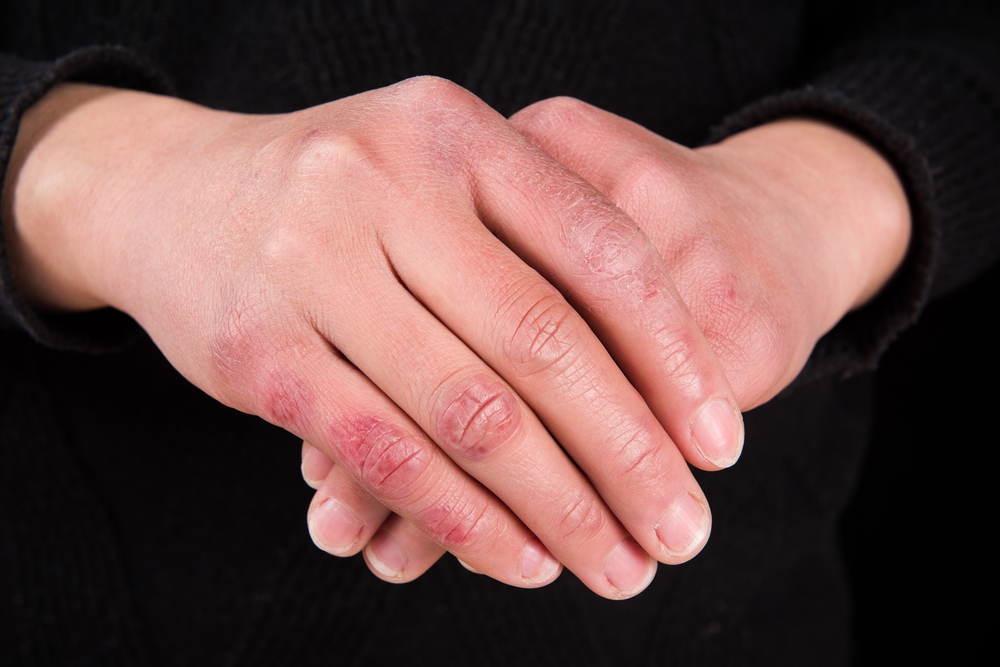If you have been diagnosed with chilblains, you know how painful they can be during cold weather. Niacin may provide some relief and may even prevent you from getting chilblains. Read on for more details about niacin and chilblains.
What are chilblains?
Chilblains (also called pernio) involve inflammation of the extremities induced by cold and moist conditions. The symptoms include itchy patches on the skin of the fingers and toes that may become painful or ulcerated. The affected skin can look red or purple. Chilblains are more common in above-freezing temperatures and are not the same as frostbite (frozen tissue). Children, women, and the elderly are more often affected. Individuals with a connective tissue disorder (such as systemic lupus erythematosus) or even exposure to COVID-19 may be more at risk.
While the cause of chilblains is not clear, they are related to constriction and expansion of the small blood vessels of the feet, hands, or even ears and nose. A damp, cold environment is the trigger, and moisture increases heat loss from the skin.
A similar but distinct condition is Raynaud’s Syndrome. It is associated with observable changes in skin color (white, red, and blue). This occurs during cold weather (or even stress) when spasms in small blood vessels limit circulation to fingers, toes, or other areas.
Some people suffer from both Chilblains and Raynaud’s Syndrome. So, some scientists think that these conditions may be part of a continuum. Raynaud’s is an acute and readily reversible vasospasm. Chilblains may be a more prolonged vasospasm with more chronic changes to tissue.

Chilblains on a woman’s hands
Niacin for treatment and prevention of chilblains
If you have chilblains, it’s important to reduce exposure to the cold and damp winter environment. Protect your hands, feet, and head by wearing warm, loose-fitting clothing. Moisture-wicking material like wool can help to decrease dampness. Avoid tight-fitting clothing or shoes as that reduce circulation. A fragrance-free, gentle lotion can help keep the skin moisturized. Do not rub or scratch the area. Symptoms usually resolve within 1-3 weeks but see your healthcare provider in severe cases or if you think you have an infection or frostbite.
If you’ve had chilblains, you probably want to prevent them from recurring. Niacin (vitamin B3 or nicotinic acid) may be helpful. Nicotinic acid should not be confused with nicotinamide (or niacinamide), which is often used for skin conditions and may prevent nonmelanoma skin cancer.
Nicotinic acid was proposed as a treatment for chilblains in a 1948 publication in the British Medical Journal. Twenty-seven people were treated with 50 mg of nicotinic acid three times per day after a meal. Results indicated that 15 cases of chilblains were cured, 11 improved, and only 1 person showed no improvement.
Nicotinic acid works as a vasodilator
Nicotinic acid is a vasodilator, opening up the blood vessels to increase blood flow. It may cause flushing due to the increased blood flow to the extremities. Little additional research has been conducted on the use of nicotinic acid to treat or prevent chilblains. However, it is often listed as a potential home remedy for chilblains. Side effects can include headache, dizziness, flushing, and upset stomach. You should not take large amounts of niacin if you have liver disease, peptic ulcer disease, heart disease, or severe low blood pressure unless directed by your physician.
Physicians may prescribe other vasodilators, such as nifedipine, or other calcium channel blockers to prevent chilblains. Sildenafil (the ingredient in Viagra®) has also more recently been shown to treat chilblains in female patients.
The incidence of chilblains is lower in the United States than in some European countries, but rates increased during the COVID-19 epidemic. If you find yourself suffering from the effects of chilblains, niacin might be helpful to prevent further episodes. As with all treatments, be sure to talk to your physician before taking any medication.



